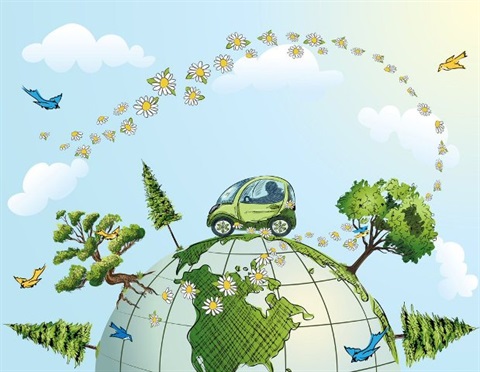How You Can Be More Green

We can all make smart choices to positively impact our quality of life. When we make decisions based on how our actions affect our community we attain environmental, aesthetic, psychological & economic benefits. Clean water & air, pleasant surroundings, a sense of well-being and more money in our pockets are just a few.
The following are simple things that you can do in your own home or neighborhood to protect our environment and green your world.
Make Simple Lawn Care Choices
Choose native plants, spot treat problem areas, or better yet, consider less toxic alternatives such as beneficial insects. Use the mulching feature on your lawn mower instead of bagging the clippings, or better yet, create your own compost from your yard waste. Learn more about proper yard waste disposal.
Put Rainwater to Use(PDF, 156KB)
Rain gardens and rain barrels put rainfall to use, reducing the need for irrigation. Save money while protecting our water supply. Residents of the City of Columbus who have signed up as GreenSpot members are invited to buy a deeply discounted rain barrel, while supplies last. Join the GreenSpot Program; it's easy. Learn more about this offer!
Start a Community Garden
A community garden is a single piece of land gardened collectively by a group of people. They provide fresh produce and plants as well as satisfying labor, exercise, neighborhood improvement, sense of community and connection to the environment.
Dispose of Yard Waste Properly - Pet Waste Too
Waste must be properly prepared and placed for collection. Leaves swept into the curb will not be collected in Columbus. Dumping yard waste into storm drains or waterways adds excess nutrients to the water, can clog drains & contribute to flooding. Better yet, compost & mulch yard waste.
Energy Savings Tips
Learn how to save energy year round. Plus, link to a rebate offer for a new programmable thermostat or low flow shower head.
Take the PUP Pledge
Take the PUP Pledge - get a free pooch prize. Cleaning up after your dog is a simple, everyday thing you can do to help keep waterways free of harmful bacteria. Clean Water is the Goal.
Get Your Garden in Full Bloom with Com-Til
Com-Til products are organic fertilizers and soil conditioners used for mulching, gardening, potting, transplanting and breaking up tough, clay soil. Add valuable organic matter & nutrients to give your greens a boost or use as a decorative mulch to retain moisture. It is one of the best-kept secrets for improving soil health, growing a greener lawn and getting your garden in full bloom.
High Bills and Outdoor Seasonal Watering
A high water bill can signal a problem such as a leak, or be the result of seasonal, outdoor water usage (watering the lawn or garden, washing the car, etc). The resources below should help you establish what is average, determine the cause of a high bill and reduce your water usage.
Meter Outdoor Water Use, Reduce Sewer Charges
Those using large amounts of water not entering the sewer system (outdoor watering, irrigation systems) could save by installing an auxiliary meter system. The system must be purchased, installed and maintained privately.
Dispose of Household Hazardous Waste Properly
Household hazardous wastes are materials used in the home that can cause injury or are harmful if disposed of improperly. Never dump these items into a storm drain, open waterway or ditch. Learn how to dispose of such items properly - there are many free drop-off locations.
Reduce Stormwater Runoff
Pave less and landscape more, or pave with pervious surfaces. Use a rain barrel to collect rainwater; plant a rain garden, trees & shrubs. Use soaker hoses or drip irrigation and don't over-water. Aim sprinklers away from paved surfaces - they don't need watered.
Home Conservation Tips
Conservation practices provide savings for your wallet while protecting the environment.
Join GreenSpot
Looking for more ways to save money and go green for the environment? GreenSpot has over 40 different ideas of how to green up your home.
Do Not Pour Kitchen Grease Down the Drain
Do not pour cooking oils & grease down the drain after preparing meals. Fats, oils & grease (FOG) can clog sewers, resulting in basement backups and costly repairs.
Don't Litter, Volunteer for Clean-Ups and Other Events
Trash left along roadways, ditches and stream banks washes into our waterways through rain and melting snow. Not only is littering illegal, it is an eyesore, can endanger wildlife, provide breeding grounds for mosquitoes, can block storm drains and cause flooding.
Make Smart Choices Maintaining Cars & Driveways
Simple steps can prevent many common pollutants from washing off your driveway into the curb and down storm drains that lead (untreated) into rivers. Consider porous pavement options when possible.
Report Potentially Hazardous Spills or Dumping
If you see a potentially hazardous material flowing to a storm sewer, ditch or waterway, immediately call 614-645-STREAM (7873) and the Ohio EPA at 1-800-282-9378.
Keep it Clean
Prevent water pollution through everyday living with simple tips to keep our water clean. Simple steps you can take at home such as: disposal of household hazardous waste, yard waste (including pet waste) and cooking grease; making simple lawn care choices; reducing stormwater runoff; maintaining cars & driveways properly; litter clean-ups & more.